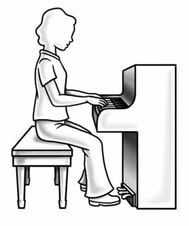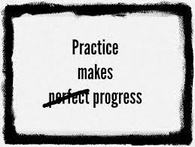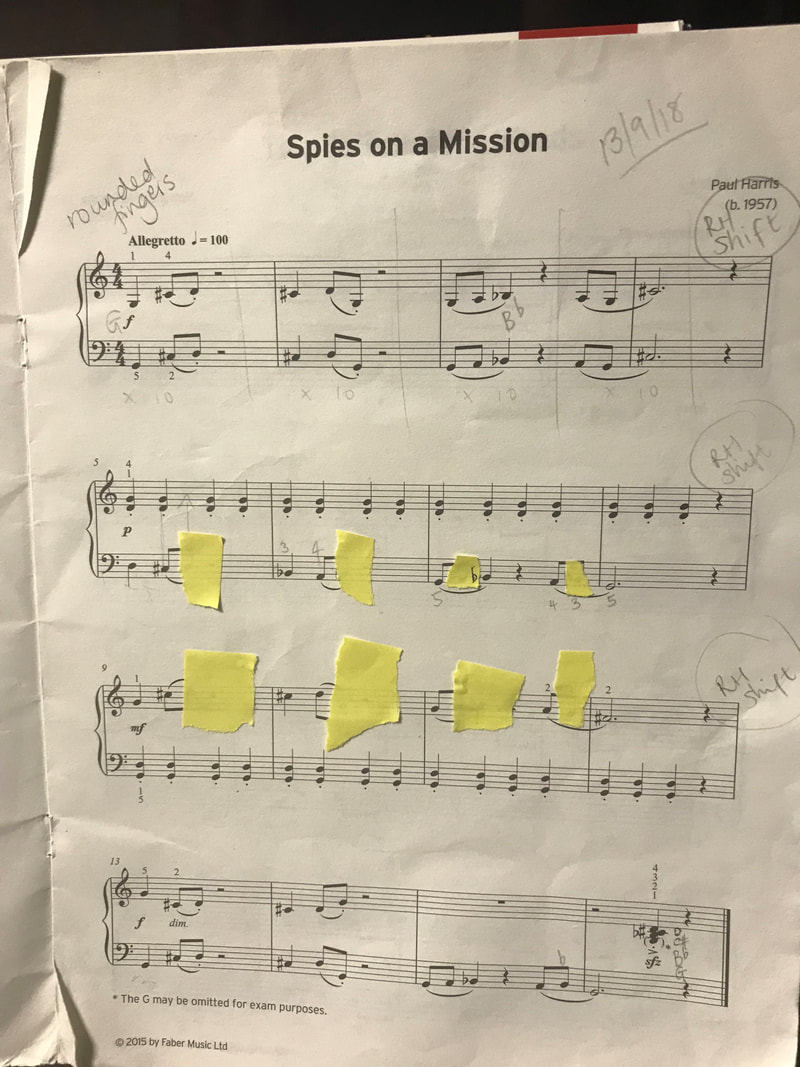 OOooh, it's been quite a while since I last posted! I'm still in the Swindon area, teaching piano privately 1:1 at two local schools, and in a group setting at The Bee's Keys Piano Studio, which is really interesting. A great contrast to have and it's always lovely to work as part of a team with similar values and visions. I'm also into my second year teaching part time KS3 (classroom music) at a local secondary school, after having had a long break from it pre-pandemic due to ill health. Always good to have a few irons in the fire! I've been running taster piano sessions at one of my schools recently, and am excited to be taking on two new primary aged students starting tomorrow! Beginning to mull over ideas for holiday workshops, and how to celebrate my upcoming 20th anniversary year of being a teacher - watch this space!
0 Comments
 Hi everyone Whether you're a beginner or a pro, whether you have a keyboard or a grand piano, good posture is a really important aspect of learning to play. Good posture is fundamental to developing correct technique, and making you a better pianist because it will ensure that you are set up for practising/performing well, and for longer, minimising the risk of injury. Here are my top 5 tips for good posture at the piano: 1) make sure your back is straight and shoulders are relaxed, and neck is in line with your spine (try not to crane your neck forward) 2) both feet are flat on the floor (if you can't reach the floor, place a few books under your feet) 3) fingers are rounded (not flat) 4) forearms are at right angles to the floor 5) sit 'perched' on the front half of your stool / chair For more reading, take a look at this brilliant site https://www.libertyparkmusic.com/essential-tips-maintain-good-piano-posture/ which goes into more detail about the reasons why good posture is so important. I saw a brilliant post on social media* recently which I wanted to share with you all. It's about changing the language we use with our kids when encouraging them to practise - which as we all know, isn't always plain sailing :-)
Instead of 'telling' or 'making' your child practise, try these positive alternatives:
Avoid being excessively critical:
And as for encouraging music to be enjoyable - make music (and the other arts, of course!) a regular part of life, not just something else on the to-do list. Whole family activities that involve music:
Do give these a try - and let me know how it goes! * Thanks to @melspianostudio for sharing the article. Hi everyone! How was your summer?
This is first question I will be asking each of my students when I start teaching again next week. I do love my holidays but after a while, I do miss the routine of work and of course seeing my students from week to week. This summer has been a bit of a different one for me; I've been learning to DJ! And I am loving it. My new boyfriend has been teaching me (he used to be a club DJ) on his new kit, the Pioneer DDJ-1000 running Rekordbox software. It is awesome! It takes a while to get the hang of it but I am finding I am getting better and better all the time - this evening I was mixing my own weird and wonderful playlist from my iTunes in with his more classic house tracks. I love any opportunity for tapping into my eclectic tastes and just seeing what happens; going with the flow. I'm at the stage now too where I'm working on producing in real time whilst mixing tracks in and out, playing around with the filters and EQs... I've also been writing my own music this summer, which is great as it's been something I've been meaning to get back into for a while now. I've been writing dance tracks mainly, using Logic Pro X, and then flying them into Rekordbox to see what they sound like mixed in to other 'actual' tracks. It's been really exciting - especially the bit when I've been going around recording samples of youngsters saying random things like "whatever!" and "don't tell mum, I've bought a horse"... we've had so many laughs doing that! So I look forward to hearing how everybody else's summer has been. My teaching from home starts again next week, and I'll be back in schools the following week. So I am in the process of sorting out my phased return to work after having unfortunately suffered a second SCAD a month ago. I was secretly hoping that I was going to be one of the lucky ones not to suffer a recurrence... but I was wrong. I haven't a clue what the trigger was. It was scary and traumatic, and all of the things that I experienced after my first one. I spent a week in hospital, but for some reason, I have managed to bounce back much, much more quickly this time around.
I have genuinely missed my piano teaching. I've missed having a purpose. I've missed the smiles of my students, the interactions, the challenges, the breakthroughs, the stories they tell me about what they did at the weekend... and I can't wait to get back to it. I have had so many lovely messages of support and warm wishes from all the parents/carers/colleagues and they have really kept me going. Thank you everyone, for your patience! Looking forward to seeing you very soon x  The saying “practice makes perfect” is misleading. It can also in some contexts be quite demoralising. You see, for anything to be ‘perfect’ implies something finite, something that is so exquisite that it can not be improved or surpassed, and is something that is so superior that it is uncommon to achieve and therefore virtually impossible. We end up being in competition with ourselves and other people. THIS IS COMPLETELY THE WRONG APPROACH TO TAKE WHEN LEARNING A MUSICAL INSTRUMENT! Or learning anything, for that matter. Learning is transient. It is not linear. Learning happens when content is broken down into “manageable chunks” and a “scaffolding” approach is used by the teacher. Sometimes it goes well and it ‘sticks’. Sometimes we have learning blocks. Sometimes things make sense straight away! Sometimes they don’t. Learning is not solely reliant on one factor, like just the teacher, or just the student. An effective learning environment is reliant on a multitude of factors: the student/teacher rapport, the subject knowledge, the pace and variety of the lesson, the physical environment, emotional intelligence, personal resilience, what is going on at home, or with friendship groups, or simply how we happen to be feeling at that time of day. All of that is ok. All of that is ‘normal’. What is important is that nobody gives up. I include me (the teacher) in this. In my first lesson with students, there are a number of stock things I tend to say, to do with technique “make sure your belly button is lined up with middle C” (to ensure the student is sat centrally at the piano) or “try not to squash the mouse in the house!” (reminding students to keep their hand shape/fingers rounded on the keys, and not flat). But one of the most important points I always make in the first lesson is that I honestly don’t give a monkey’s about mistakes. I even play any old rubbish for them and make lots of deliberate mistakes to show that actually, nothing bad will happen if they play a wrong note. The ceiling isn’t going to fall in, no-one is laughing and/or pointing, the world is not coming to an end. The student often looks at me aghast, as if I am completely bonkers (well, a little bit of bonkers does help now and then!), and I repeat to them “no, seriously, I don’t care about mistakes at all. What I care about is that when you make a mistake, you never give up.” Of course, this is a challenging idea for us all to incorporate into our daily lives anyway, but as long as my students know that it is absolutely ok to make mistakes and that they are a crucial part of the learning process, that is all that I can ask in terms of them having a positive approach to learning. Practising is transient. It is not linear. But! It needs to be mindful, and regular. PROGRESS is what we are after. And yet, even progress is not linear. We are not aiming for perfection. Well, some of us (think we) are, and have we achieved it? Can we truthfully say that we are ‘perfect’ in one or some aspects of our lives? Surely the notion of perfection is relative, anyway? What is a perfect cappuccino for me is inevitably going to be different to someone else’s. (I happen to be going through a phase of enjoying mine coconut milk and chocolate sprinkles at the moment, just in case you’re wondering. But who’s to say I won’t like it that way next week?) Anyway - back to the matter in hand: aiming for perfection (whatever our idea of perfection may be) often leads to all sorts of self-critical inner dialogue that actually delays or even prevents us from even having a go. This sort of self-sabotage is quite common in many aspects of our personal lives and of course is a challenge I am sure we are all familiar with to one extent or another. However: the two main points I must make here are 1) as long as we aim to adopt a more mindful approach to things, i.e. that we simply ‘notice’ or ‘observe’ without emotional reaction or judgement when we make mistakes, then surely that is crucial for positive progress. Instead of panicking, or throwing in the towel, or criticising ourselves when a mistake is made, we simply ‘acknowledge’ it, and calmly say to ourselves, ‘it’s ok, all that happened there was a wrong note was played. What needs to be done to rectify the situation?’ [Notice how I have completely removed the notion of ‘I’ (the self) from those sentences. I just find that for me personally, it helps to voice things in the third person in order to maximise the efficacy of mindfulness.] The second point I wish to make is in order to make positive progress, a student needs to have all the tools and skills available to them in order for them to help themselves improve and develop whatever it is they are working on. The tools and skills fall into two types: emotional resilience, and practical strategies. I teach all sorts of students, of all ages, of all walks of life, and as a teacher, it is my responsibility to facilitate their learning in the best way I can for them as an individual. One size does not fit all. In the course of the first few lessons, all my students are shown and taught different strategies for practising, so that students soon develop the skills to become ever more independent and discerning when it comes to taking responsibility for their own learning. The best progress happens when:
In conclusion, it is important to remind ourselves that learning to play an instrument, rather like learning a sport or a language, or even starting a business, is very much a long game. Success has its roots firmly in the attitude and approach we choose to take. It is all about the process, and how we apply ourselves with determination and drive. In this day and age, where the concept of ‘instant gratification’ is becoming more and more an integral part of our lives, perhaps more so than we realise, the idea of gradually and patiently working towards something sits less and less comfortably with ourselves. As a piano teacher, I cannot promise perfection. But I can guarantee that I can help you progress. Wishing all my students and their families a very merry Christmas, and a happy New Year.
You know what has been especially wonderful this year? So many of my students coming to me excited to tell me that they are getting a new keyboard or a piano for Christmas! This is just the best news for me as a piano teacher. Also, all the hugely positive feedback I have received from parents/carers. All this reaffirms to me that I have already made a positive impact with my recent career change and that it certainly was the right move for me. More soon... x "Hands tog" is piano teacher language for "hands together". Which is probably the biggest challenge any student will face when learning the piano - going from playing "hands sep" (separately) to "hands tog". I was working with a student this afternoon who was struggling to play her piece hands together. She could play it fairly confidently hands separately, and I wanted to her to have a go playing hands together during the lesson, so that it would be one of her 'action points' for her practice during the week. We ended up doing this: As you can see, the focus in today's lesson was the middle two lines. She was able to play the chords in the relevant hand as though on 'auto pilot' but struggled with the crotchet+2 quavers melodic pattern in the other hand. I got some sticky notes, ripped them into tiny pieces, and covered up the melody notes that were not 'on' the beat. Then my student had a go putting the reduced version hands together. It worked! It worked, because 1) psychologically, it was more manageable having broken down the task to just playing the notes that 'go together', rather than adding in the ones that 'go in-between' as well. As she feels more and more confident with this approach, she will remove one of the sticky notes at a time, and have a go adding those in. Next lesson, we'll be working on the other two lines.
I love sticky notes! My students will often hear me say to them, "ok, count yourself in...".
Hang on, what does that even mean? To "count in"? Well, it's all about the numbers you say before you start playing. At the beginning of each piece, you have the time signature. This is two numbers, one on top of the other. The top number indicates how many beats are in each bar, and the bottom number indicates the type of beat (4 = crotchet beats, 8 = quaver beats, 2 = minims). So, if the time signature states 4/4, there are 4 crotchet beats in a bar. So you would count in by saying out loud, "1, 2, 3, 4" at the exact speed at which you want the pulse of the music to go, and then you would start playing in time to that pulse that you have established. If the time signature states 3/4, there are 3 crotchet beats in a bar, and you would count "1, 2, 3". I also get my students to tap their foot (or tap their toes inside their shoe) along with the counting, and then to continue tapping their foot/toe whilst playing. It's not easy - it's a bit like co-ordinating patting your tummy whilst stroking your head in circles - but it is so worth getting into the habit and well worth the practice. Another good tip is to actually imagine how the piece goes in your head before you start counting in. Parents/carers - you can help out here by checking to see if your child is tapping their foot whilst playing, and if you tap along too, you will easily be able to check to see if your child is inadvertently speeding up or slowing down! This is one of the most common concerns a parent/carer comes to me with when I get a new student. Here is my response to a parent's recent request for advice and guidance on what implications the differences between the two make.
In short: a real (acoustic) piano is always the ideal! That said, a keyboard is a good alternative when budget/space are limited, and you have the added 'fun' factor of different instrument sounds and drumbeats/demos. And of course the student can plug headphones in so s/he can practise at any time of day/night! Essentially, however, it is far better to learn piano first, then move to keyboard later if desired. The reason is that when you learn piano and practise on a piano, your technique will be far stronger and more advanced, as the muscles in the hands/fingers will be well-trained to achieve all the necessary agility and dexterity required to play a wider range of styles/techniques. This is to do with how the piano is made - the keys are 'heavier' to press down (properly weighted), and larger, and of course the piano has the foot pedals to enable to pianist to adjust the timbre for expressive purposes. The piano is made from a combination of solid wooden components, metal, felt, and steel. As such, the piano has a completely different feel to a keyboard, which (because it is made purely from plastic and electronics) will tend to have 'spongier' (lighter, less responsive) keys, is usually shorter in length (ie. less/smaller keys), and a far narrower breadth of expression available to the player. It is easier to go from playing the piano to the keyboard, rather than from the keyboard to the piano. It's a bit like if you learn to drive in a manual car, then driving an automatic is fairly straightforward to adjust to, whereas if you learn to drive in an automatic, adjusting to driving a manual car is really hard! If you have the choice between getting a piano or a keyboard, I would say go for the piano, every time. The piano I have at home is a beautiful 1980s Silberman upright piano, with a soft but clear tone and perfectly balanced and weighted keys. However, if I won the lottery, I would be going straight to Steinway in London for one of their grands... Useful articles: https://www.dawsons.co.uk/blog/best-upright-piano https://www.telegraph.co.uk/finance/personalfinance/investing/9966145/Buying-pianos-a-grand-idea-for-an-investment.html I am often asked for keyboard recommendations. Below is a range of keyboards with different functions and price brackets (please note, other brands/retailers are, of course, available): https://www.dawsons.co.uk/yamaha-psr-e363-portable-keyboard - a basic keyboard, with lots of fun sounds and drumbeats, fun for beginners. www.gear4music.com/Keyboards-and-Pianos/DP-6-Digital-Piano-by-Gear4music-and-Accessory-Pack/12SU - a great bundle (comes with headphones, an adjustable stool, a sustain pedal etc) and excellent quality weighted keys. Not as many 'fun' features as the basic keyboard above, but this would last the student a good few years past beginner stage and into intermediate. https://www.dawsons.co.uk/yamaha-ydp-143-digital-piano-rosewood less portable, but an excellent example of an affordable 'proper' digital piano which would take the student well into intermediate level, especially if s/he would like to do grade exams in the future. Alternatively, if you have the time I would recommend you go into a music shop (e.g. Holmes Music in Faringdon Road, Swindon) to try some out and see what you like. |
About me...Music teacher, educator, SLE consultant. Sharing the love in all things relating to music education. Archives
January 2023
Categories |

 RSS Feed
RSS Feed
